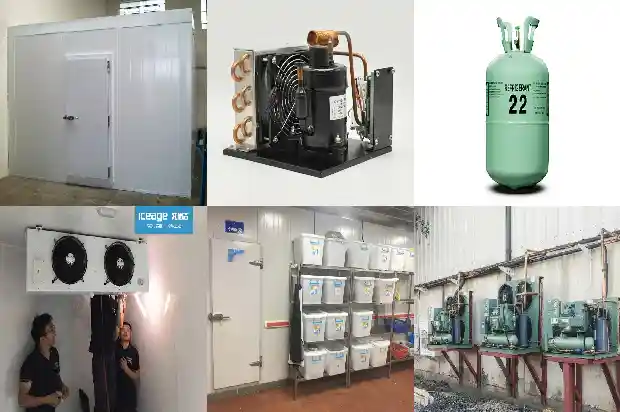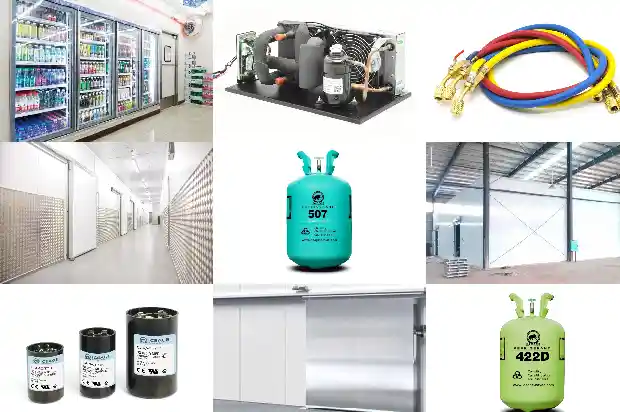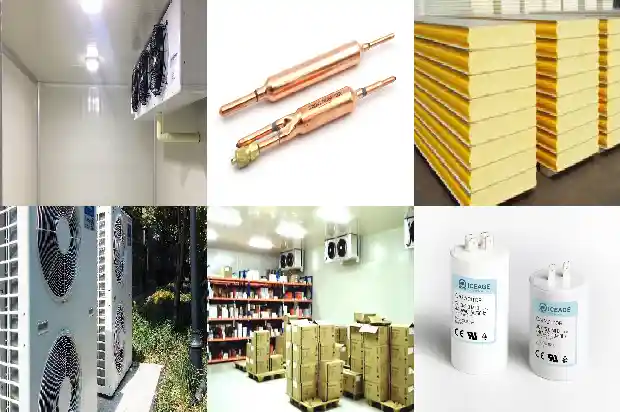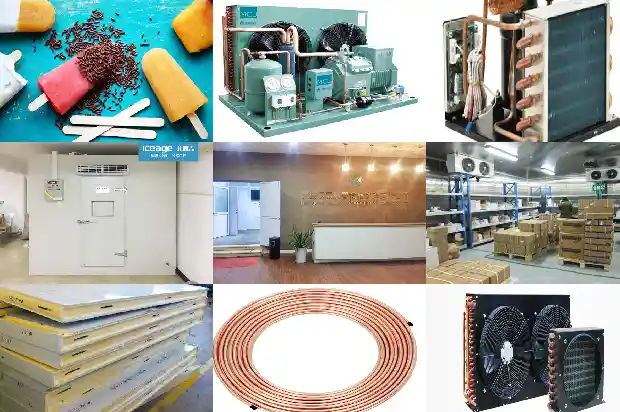Common Causes of Damage to Scroll Compressors
2025-03-16
Compressor Oil Deficiency and Inadequate Compressor Lubrication
When the compressor is operating, a large amount of refrigerant gas is discharged, and at the same time, a small part of the lubricating oil is carried away. Short - term oil deficiency in the compressor will cause abnormal wear of various related components inside the compressor, resulting in vibration and loud noise. Long - term oil deficiency will cause overheating of various related components inside, leading to bearing sintering, shaft seizure, built - in compressor protection, exhaust or top - temperature protection, over - current protection, power supply air - switch tripping, abnormal compressor running sound, and excessively high compressor cavity temperature.
Reasons:
When the compressor is operating, a large amount of refrigerant gas is discharged, and at the same time, a small part of the lubricating oil is carried away. Short - term oil deficiency in the compressor will cause abnormal wear of various related components inside the compressor, resulting in vibration and loud noise. Long - term oil deficiency will cause overheating of various related components inside, leading to bearing sintering, shaft seizure, built - in compressor protection, exhaust or top - temperature protection, over - current protection, power supply air - switch tripping, abnormal compressor running sound, and excessively high compressor cavity temperature.
Reasons:
- The compressor starts and stops frequently for a long time.
- The system contains air or moisture.
- The system has liquid return or refrigerant migration dilutes the lubricating oil.
- The compressor rotates in reverse (such as wrong phase sequence).
- Refrigerant leakage in the system makes the compressor lubricating oil scarce.
- There are other chemical substances in the system, which react chemically with the lubricating oil and deteriorate it.
Compressor Liquid Hammer
When a large amount of liquid returns to the compressor, the liquid droplets will generate a great impact force on the scroll plate during the compression process, which may break the scroll plate. The lubricating oil containing a large amount of liquid refrigerant has a low viscosity and cannot form an adequate oil film on the friction surface, resulting in rapid wear of the internal moving parts of the compressor. The refrigerant in the lubricating oil will boil when heated during transportation, affecting the normal transportation of the lubricating oil. The fragments of the scroll plate after liquid hammer fall on the coil, damaging the coil insulation layer. There may be current protection or the built - in compressor protection may not operate.
Reasons:
When a large amount of liquid returns to the compressor, the liquid droplets will generate a great impact force on the scroll plate during the compression process, which may break the scroll plate. The lubricating oil containing a large amount of liquid refrigerant has a low viscosity and cannot form an adequate oil film on the friction surface, resulting in rapid wear of the internal moving parts of the compressor. The refrigerant in the lubricating oil will boil when heated during transportation, affecting the normal transportation of the lubricating oil. The fragments of the scroll plate after liquid hammer fall on the coil, damaging the coil insulation layer. There may be current protection or the built - in compressor protection may not operate.
Reasons:
- Excessive refrigerant addition leads to a large amount of liquid return in the system.
- The indoor unit fan does not rotate or has a small air volume, etc., resulting in incomplete refrigerant evaporation.
- When the power is cut off, the EXV valve still maintains a certain opening degree, causing a large amount of liquid return in the system.
- Excessive oil addition leads to oil hammer in the system (low - pressure - chamber compressor).
Compressor High - Temperature Burnout
High - temperature overheating of the compressor is manifested as exhaust or top - temperature protection, excessively high compressor cavity temperature, and high - pressure protection. Long - term high - temperature overheating not only reduces the insulation performance and reliability of the motor, shortening the motor life, but also reduces the lubricating ability of the lubricating oil, and may even cause carbonization and acidolysis of the lubricating oil.
The acid - decomposed lubricating oil will cause copper - plating phenomenon. The fine metal debris generated by wear after copper - plating is mixed in the lubricating oil. On the one hand, it weakens the lubricating effect of the lubricating oil. On the other hand, the fine metal debris, due to its magnetism, accumulates in the motor winding, forming a conductive loop, causing partial discharge or coil short - circuit.
Reasons:
High - temperature overheating of the compressor is manifested as exhaust or top - temperature protection, excessively high compressor cavity temperature, and high - pressure protection. Long - term high - temperature overheating not only reduces the insulation performance and reliability of the motor, shortening the motor life, but also reduces the lubricating ability of the lubricating oil, and may even cause carbonization and acidolysis of the lubricating oil.
The acid - decomposed lubricating oil will cause copper - plating phenomenon. The fine metal debris generated by wear after copper - plating is mixed in the lubricating oil. On the one hand, it weakens the lubricating effect of the lubricating oil. On the other hand, the fine metal debris, due to its magnetism, accumulates in the motor winding, forming a conductive loop, causing partial discharge or coil short - circuit.
Reasons:
- The system vacuum degree is insufficient.

- Excessive refrigerant leakage or too little refrigerant is added.
- Ice blockage in the system suction pipe leads to excessive exhaust or top - temperature.
- The connecting pipes are too long or the pipe diameter is small, increasing the system resistance and resulting in an increase in exhaust temperature and pressure.
Compressor Motor Damage
Motor damage is mainly manifested as damage to the insulation layer of the stator winding (short - circuit) and open - circuit, etc.
Reasons:
Motor damage is mainly manifested as damage to the insulation layer of the stator winding (short - circuit) and open - circuit, etc.

Reasons:
- Melting or abnormality of the contactor contacts, such as phase - loss, unbalanced phase.
- The rated power - supply voltage should not exceed ±10%.

- The three - phase voltage unbalance rate should not exceed 3%.
- When the voltage is unbalanced, the load current is 4 - 10 times that of normal operation.
All the above reasons may cause the worn metal debris to damage the insulation layer of the coil and burn out the motor.
- Inadequate motor cooling. When there is a large amount of refrigerant leakage or the evaporation pressure is too low, the system mass flow rate will decrease, making it impossible for the motor to be cooled properly.
Related Articles
- Abnormal Phenomena and Causes during the Operation of Reciprocating Refrigeration Compressors
- Analysis of the Causes of Frost Formation at the Suction Port of the Refrigeration Compressor
- Common Fault Causes and Solutions of Cold Storage Systems
- Common Fault Causes of Totally Enclosed Refrigeration Compressors
- Analysis of the Causes and Hazards of Corrosion in the Circulating Water System
- Common Fault Causes and Replacement of Multi-connected Unit Compressors
- What Causes the Indoor Unit of an Air - conditioner to Freeze? Here's the Answer~
- Analysis of Causes for Compressor Liquid Hammer, Overheating and Pre - heating
- Causes and Solutions of Ice Blockage, Dirt Blockage and Oil Blockage
- What Are the Common Causes of High - pressure Faults in Chillers?
- What Are the Common Causes of Cold Air Blower Noise?
- Air - conditioner Low - pressure Alarm? These Nine Common Causes
- What Are the Causes of Scroll Compressor Damage?
- Causes and Prevention of "Primary Condensation" and "Secondary Condensation" in Fan - Coil Units
- 10 Symptoms and Causes of Abnormal Frosting in Heat Pumps
- Common Causes and Analysis of High and Low Pressure Alarms
- Common Causes and Analysis of Compressor Thermal Protection
- 4 Points on Causes of Water Leakage in Closed Cooling Towers
